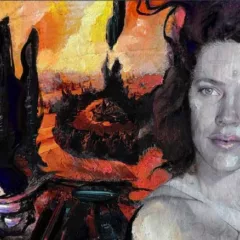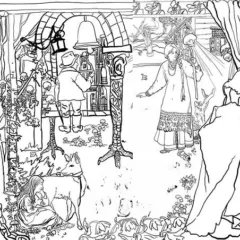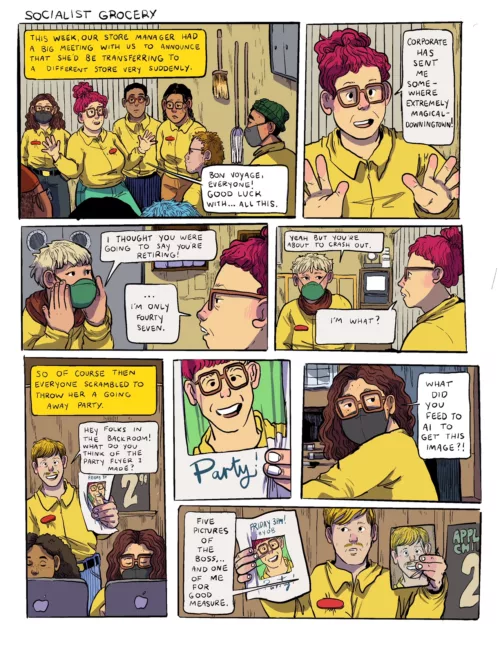[Donald reviews a concert fusing traditional Arab sounds with contemporary pieces and musicians. — the Artblog editors]
When attending performances, I always hope to make new discoveries—to experience sounds and sights I’ve never heard before. On May 24, 2014, I was fortunate to attend a concert in Philadelphia that showcased not so much the American or Western side of the world’s musical tastes, but those of the Middle East and Latin America.
Monthly musical melange
Al-Bustan Seeds of Culture, a nonprofit dedicated to presenting and teaching Arab culture through the arts and language, holds a monthly Arab concert series featuring innovative musicians from a variety of musical disciplines in collaboration with their resident musical group, the Al-Bustan Takht Ensemble.
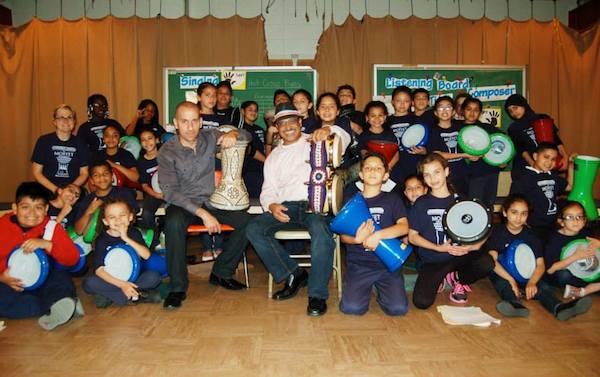
This month, Al-Bustan featured Puerto Rican-born percussionist Rolando Morales-Matos. Morales-Matos maintains a close connection with the Philadelphia music community, as he serves as a percussion faculty member at the Curtis Institute of Music—one of the very top music schools any aspiring musician could hope to attend (Curtis has the lowest admission rate of all colleges or universities in the United States).
The concert opened with “From the Earth,” a percussion solo played and composed by Morales-Matos. The colorful solo transported the audience to the sounds of the jungle, with blowing winds, whistles, and thumping all illustrated by Morales-Matos’ inspired playing. Midway through the solo, the first rhythm of the night set in, with a familiar quietness returning to close the piece.
Al-Bustan has partnered with John Moffet Elementary School since 2007; a huge part of the partnership lies in the after-school program, which gives students a chance to study percussion and visual art. The Moffet School Drummers, a group of 3rd-5th-grade children (who had been sitting in the audience) entered immediately following Morales-Matos’ solo.
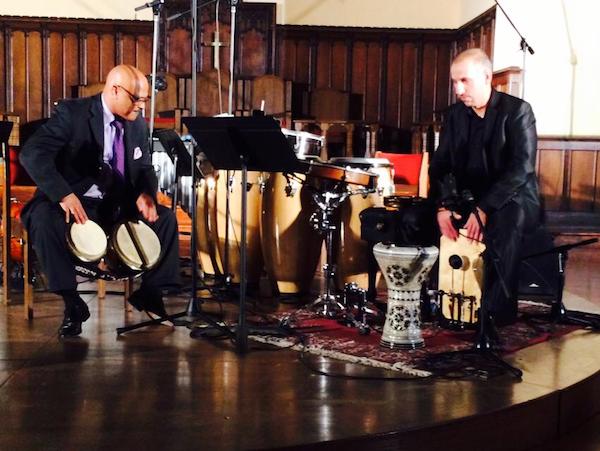
The Moffet School Drummers played their solos on red, green, and blue bongos, and clearly had a ball. As their solos increased in tempo, all of the students played in unison through the challenging passages with ease. “All I can say is, I love these kids!” said percussionist Hafez Kotain, who trains the students for 40 minutes, four times a week after school. The power and importance of music education was on full display here.
Familiar and unfamiliar sounds
The Takht Ensemble then assembled, joining Morales-Matos and Kotain. The chamber ensemble includes violinist Hanna Khoury, cellist Kinan Abou-afach, and oud player Kinan Idnawi. The group has great musical chemistry, although throughout much of the concert, the percussion drowned out the strings. There came a point in the evening where the sound had to be altered in order for the strings to be heard more clearly, with the musicians signaling to the sound team to increase or decrease levels so that the instruments balanced each other out. Once the adjustment was made, there was a huge improvement in the overall sound.
In between the pieces, I noticed that the string players tuned their instruments significantly lower than what I was accustomed to. Typically, string instruments are tuned to concert A; however, in this concert, the strings were tuned a fourth higher according to Middle Eastern musical notation and a whole octave higher according to Western notation. This process is called the standard “Arabic tuning”.
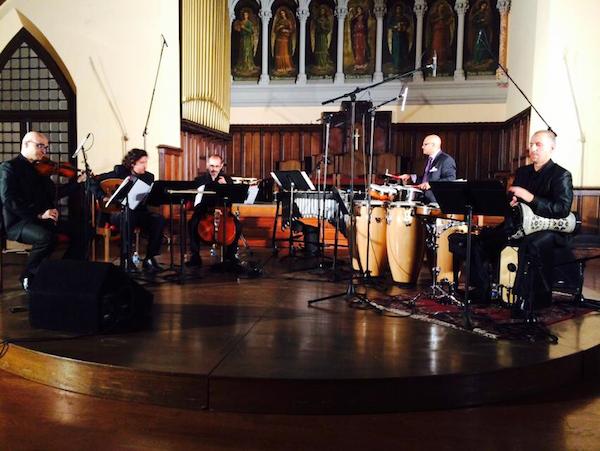
Morales-Matos and Kotain’s rhythmically precise playing made them the stars of the night evening—especially in “Time for Two,” a piece that only the two men perform. Rolando provided the higher-pitched rhythms and Kotan provided the lower-pitched rhythms. The composition felt like an improvisational battle; the audience couldn’t anticipate Kotain’s reactions to Morales-Matos’ theme and variations. It was the perfect piece to showcase the talents of two percussion masters.
Near the end of the program, we heard a very familiar tune: Elton John’s Oscar-winning song, “Can You Feel The Love Tonight?” from the 1994 Disney animated phenomenon “The Lion King”. Rolando is the percussionist and assistant conductor for the Broadway version of “The Lion King” in New York City. This song (and movie) is very special to me, as “The Lion King” was the first film I ever saw in a movie theater! Rolando played the song’s lovely melody on a xylophone, which gave it a very mystical tone, evoking African influences that the song maintained from the film.
The program’s groove was so undeniable that many of the little kids in the audience were dancing with each other, sharing their mutual love of the music being performed. Rolando uses every word in his musical vocabulary to tell his story, and to express the stories of others who may not have the courage to speak up. This concert happened to be the last of the series; as Al-Bustan executive director Hazami Sayed predicted in her introductory statement, the series closed with a bang.
For more information on Al-Bustan Seeds of Culture and its music programs, please visit http://albustanseeds.org.


